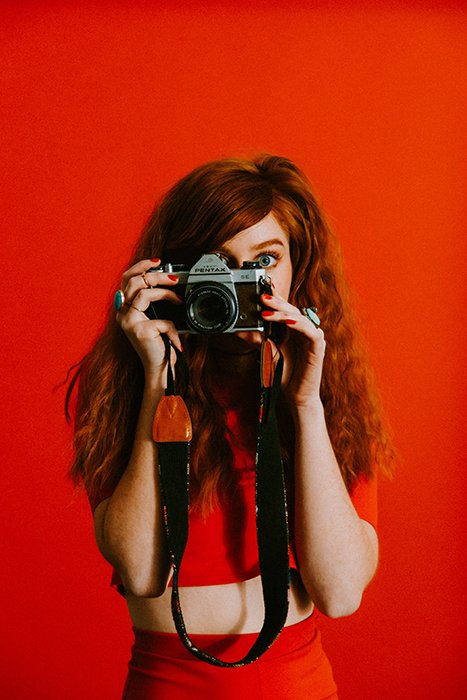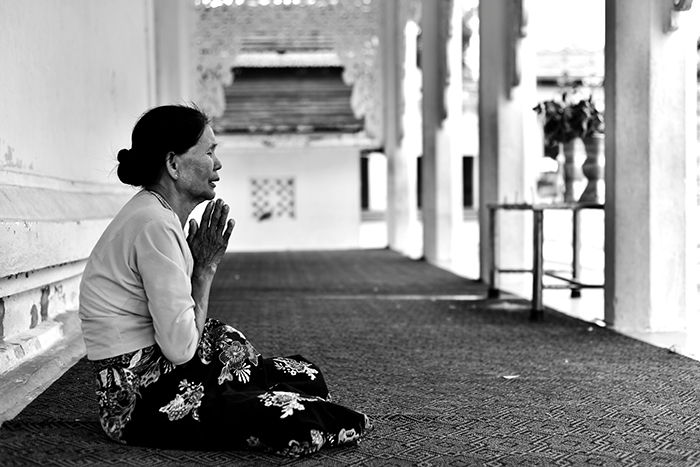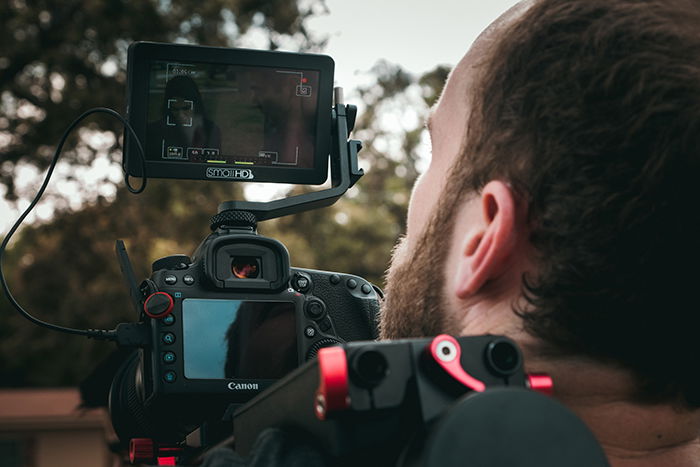There’s no specific answer that will work for everyone. But there are a few ways you can determine if a photography degree is worth it for you personally.
Benefits of Pursuing a Photography Major
Job Opportunities
If you pursue a photography major, you’ll get either a Bachelor of Arts or a Bachelor of Fine Arts degree. Both of these might improve your chances of getting a photography job in the following industries:
Photo editor: You’ll have key knowledge of photography and editing. This could make you the perfect fit for editing and retouching work. This job requires extensive knowledge of Photoshop or Lightroom. Keep in mind that you’ll probably spend more time in front of the computer than behind your camera. Photography archivist: This is a history-oriented job that involves archiving and preserving photographs. Perfect for anyone who’s obsessed with art history. Advertising art director: If you’re a fan of graphic design and teamwork, you’ll find this position very fulfilling. Advertising art directors are usually in charge of making advertisements look good. They might also be in charge of a team of designers, photographers, etc.
These are only a few of the many unique jobs you can pursue with a photography degree. You can also take the traditional approach and start a photography business. A photography degree might give you more credibility as a professional photographer in the long run.
College Perks
Going to a college or university of photography comes with many demands and perks. Oftentimes, the perks outweigh the hard work thanks to their long-term benefits. As a photography student, you’ll have access to in-depth lessons and hours of photography knowledge. You might not find these in one neat package online. Being a part of a class might give you extra motivation and even bring out your competitive side. Many photography universities offer weekly constructive criticism classes. There, you can get helpful feedback from fellow students and professional photographers. All this communication can help you build a solid group of friends and connections. This is a big plus in the photography industry. Another benefit of a photography major is being exposed to many photography techniques. Many colleges will teach you about analog and digital photography. And they will also encourage you to try out and study unconventional photography techniques. You might not end up using all the photography lessons you learn in the long run. But you’ll learn how to get out of your comfort zone and get creative with all kinds of mediums.
Self-Discipline
As mentioned before, having to attend classes will keep you accountable. If you get distracted at home, you can head over to the library. Surrounding yourself with other students in a serious environment can be motivating. You’ll also have to submit many projects during a photographer degree, some of which you might not enjoy as much as others. This, too, will strengthen your sense of self and help you persevere, even when you fail. Photography often revolves around trial-and-error and failed projects. This perseverance might help you get through dry seasons throughout your career. Last but not least, you’ll have to take thousands of photos during your major studies. This will help you develop your style. You’ll get closer to understanding the kind of photographer you want to become.
Why a Photography Degree Might Not Be Right for You
If none of the benefits of a major above stand out to you, it might be a good idea to not pursue a photography major. There are a few other things you should also keep in mind if you’re not completely sure about your decision. On average, photographers earn around $30,000 annually. If you pursue one of the jobs we mentioned, like advertising art director, you’re likely to earn twice as much. For a 4-year photography course, you’ll have to pay anywhere from $8,000 to $20,000, or more, annually. This usually doesn’t include the cost of textbooks, living, etc. If you’re a budding photographer with no budget, you might think twice about a photography major. Being in debt might be much more stressful than not having a major in photography.
Photography Major Alternatives
There are other kinds of majors you can pursue that are related to photography in some way. These degrees may lead to better pay and more ways to express yourself creatively. You can also have them as a plan B while pursuing a photography business. That way, if something doesn’t work out, you’ll still have job opportunities to lean on.
Business
A business degree offers many interesting opportunities. You can use it to become an accountant, a human resources specialist, and a management analyst, to name a few. Most of these jobs pay very well. You can also use a business degree to start a successful photography business. Using your knowledge of marketing, business law, etc., you’ll be able to manage a team of people and your budget. You can also offer your services to other photography businesses instead. This will allow you to use your business knowledge. You’ll also be involved in photography indirectly.
Photojournalism
You might enjoy raw storytelling that revolves around local or global events. A photojournalism major might be perfect for you. In general, photojournalists have to take authentic photos. These can be of newsworthy people, places, and situations. They have to be quick on their feet, know their equipment well, and be intuitive. This means they can’t be biased or edit their photography in any way. Photojournalists also have to add short captions or even articles to some of their photography. Some writing skills will come in handy here. You don’t need to pursue a writing career unless you enjoy writing articles about your work.
Filmmaking & Videography
Videographers usually film events, while filmmakers tell stories with their cameras. Both career paths can be quite fulfilling. It depends on the kind of subjects you want to photograph. Some wedding photographers end up becoming wedding videographers. The latter get paid much more for their work. Filming is very time-consuming. But it’s a great way to capture moving images and document something you care about. Depending on the job, you might also have to edit what you film. This is also very time-consuming. But it can be the perfect job for those who enjoy putting things together and color correcting.
Conclusion
When you’re figuring out if you need a photography major or not, there are many important factors you need to keep in mind. What matters most are your unique preferences. Pursuing a photography major or studying independently can be a great achievement. A photography major can open doors for you career-wise and allow you to develop your photography skills. You should consider your budget and long-term plans when making this decision.









title: “Is A Degree In Photography Worth It Photography Major " ShowToc: true date: “2023-02-18” author: “Tim Rodriguez”
There’s no specific answer that will work for everyone. But there are a few ways you can determine if a photography degree is worth it for you personally.
Benefits of Pursuing a Photography Major
Job Opportunities
If you pursue a photography major, you’ll get either a Bachelor of Arts or a Bachelor of Fine Arts degree. Both of these might improve your chances of getting a photography job in the following industries:
Photo editor: You’ll have key knowledge of photography and editing. This could make you the perfect fit for editing and retouching work. This job requires extensive knowledge of Photoshop or Lightroom. Keep in mind that you’ll probably spend more time in front of the computer than behind your camera. Photography archivist: This is a history-oriented job that involves archiving and preserving photographs. Perfect for anyone who’s obsessed with art history. Advertising art director: If you’re a fan of graphic design and teamwork, you’ll find this position very fulfilling. Advertising art directors are usually in charge of making advertisements look good. They might also be in charge of a team of designers, photographers, etc.
These are only a few of the many unique jobs you can pursue with a photography degree. You can also take the traditional approach and start a photography business. A photography degree might give you more credibility as a professional photographer in the long run.
College Perks
Going to a college or university of photography comes with many demands and perks. Oftentimes, the perks outweigh the hard work thanks to their long-term benefits. As a photography student, you’ll have access to in-depth lessons and hours of photography knowledge. You might not find these in one neat package online. Being a part of a class might give you extra motivation and even bring out your competitive side. Many photography universities offer weekly constructive criticism classes. There, you can get helpful feedback from fellow students and professional photographers. All this communication can help you build a solid group of friends and connections. This is a big plus in the photography industry. Another benefit of a photography major is being exposed to many photography techniques. Many colleges will teach you about analog and digital photography. And they will also encourage you to try out and study unconventional photography techniques. You might not end up using all the photography lessons you learn in the long run. But you’ll learn how to get out of your comfort zone and get creative with all kinds of mediums.
Self-Discipline
As mentioned before, having to attend classes will keep you accountable. If you get distracted at home, you can head over to the library. Surrounding yourself with other students in a serious environment can be motivating. You’ll also have to submit many projects during a photographer degree, some of which you might not enjoy as much as others. This, too, will strengthen your sense of self and help you persevere, even when you fail. Photography often revolves around trial-and-error and failed projects. This perseverance might help you get through dry seasons throughout your career. Last but not least, you’ll have to take thousands of photos during your major studies. This will help you develop your style. You’ll get closer to understanding the kind of photographer you want to become.
Why a Photography Degree Might Not Be Right for You
If none of the benefits of a major above stand out to you, it might be a good idea to not pursue a photography major. There are a few other things you should also keep in mind if you’re not completely sure about your decision. On average, photographers earn around $30,000 annually. If you pursue one of the jobs we mentioned, like advertising art director, you’re likely to earn twice as much. For a 4-year photography course, you’ll have to pay anywhere from $8,000 to $20,000, or more, annually. This usually doesn’t include the cost of textbooks, living, etc. If you’re a budding photographer with no budget, you might think twice about a photography major. Being in debt might be much more stressful than not having a major in photography.
Photography Major Alternatives
There are other kinds of majors you can pursue that are related to photography in some way. These degrees may lead to better pay and more ways to express yourself creatively. You can also have them as a plan B while pursuing a photography business. That way, if something doesn’t work out, you’ll still have job opportunities to lean on.
Business
A business degree offers many interesting opportunities. You can use it to become an accountant, a human resources specialist, and a management analyst, to name a few. Most of these jobs pay very well. You can also use a business degree to start a successful photography business. Using your knowledge of marketing, business law, etc., you’ll be able to manage a team of people and your budget. You can also offer your services to other photography businesses instead. This will allow you to use your business knowledge. You’ll also be involved in photography indirectly.
Photojournalism
You might enjoy raw storytelling that revolves around local or global events. A photojournalism major might be perfect for you. In general, photojournalists have to take authentic photos. These can be of newsworthy people, places, and situations. They have to be quick on their feet, know their equipment well, and be intuitive. This means they can’t be biased or edit their photography in any way. Photojournalists also have to add short captions or even articles to some of their photography. Some writing skills will come in handy here. You don’t need to pursue a writing career unless you enjoy writing articles about your work.
Filmmaking & Videography
Videographers usually film events, while filmmakers tell stories with their cameras. Both career paths can be quite fulfilling. It depends on the kind of subjects you want to photograph. Some wedding photographers end up becoming wedding videographers. The latter get paid much more for their work. Filming is very time-consuming. But it’s a great way to capture moving images and document something you care about. Depending on the job, you might also have to edit what you film. This is also very time-consuming. But it can be the perfect job for those who enjoy putting things together and color correcting.
Conclusion
When you’re figuring out if you need a photography major or not, there are many important factors you need to keep in mind. What matters most are your unique preferences. Pursuing a photography major or studying independently can be a great achievement. A photography major can open doors for you career-wise and allow you to develop your photography skills. You should consider your budget and long-term plans when making this decision.








